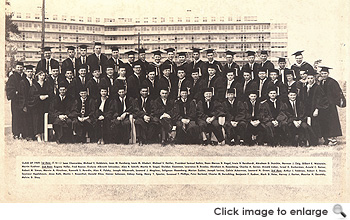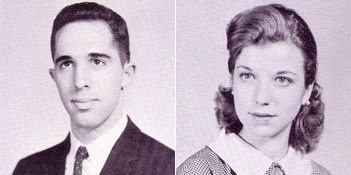FULL STORY
Einstein Celebrates 50th Anniversary of First Graduating Class
May 20, 2009 — (BRONX, NY) — When Albert Einstein College of Medicine of Yeshiva University opened its doors in 1955, Jews and other minorities were often prevented from accessing medical schools and other institutions. Additionally, the impact of McCarthyism, which began in 1950, resulted in a wide range of people from artists to college professors being targeted by Wisconsin Senator Joseph McCarthy in his attempt to root out communism. In this tumultuous time, where careers often were thwarted or destroyed by quotas and blacklists, the College of Medicine provided a beacon of hope, acceptance, and opportunity for faculty and students alike.
 Since then, Einstein's first students, members of the class of 1959, have witnessed, experienced—and in some cases spearheaded—dramatic changes in medicine and society. On June 2, on the 50th anniversary of their graduation, Einstein will acknowledge the pioneering spirit and medical contributions of the 50 graduates of 1959 with a reunion dinner, panel discussion, and special participation at the class of 2009's commencement ceremony.
Since then, Einstein's first students, members of the class of 1959, have witnessed, experienced—and in some cases spearheaded—dramatic changes in medicine and society. On June 2, on the 50th anniversary of their graduation, Einstein will acknowledge the pioneering spirit and medical contributions of the 50 graduates of 1959 with a reunion dinner, panel discussion, and special participation at the class of 2009's commencement ceremony.
From its first days, it was clear that Einstein would be a distinctive institution—one open to all, with a commitment to patients, community, and the highest standards of excellence. Dr. Peter Barland, professor emeritus at Einstein and a member of the class of 1959, recalls his excitement over being accepted to the school. "Because I was Jewish, it was very difficult. So I was anxious to go to this school because it represented a break with tradition, it represented a chance for me to be able to excel without having to worry about prejudice or bias, which was very prevalent in the those days."

Dr. Peter Barland Dr. Evelyne Albrecht Schwaber Since the beginning, Einstein has been open to students of all races and creeds—something vitally important to renowned physicist and humanitarian Albert Einstein, who lent his name to the College of Medicine in 1953. The first class welcomed many Jewish students who were denied admission to top-tier schools because of their religious affiliation. The entering class also included an African-American student and several women. One of them, Dr. Evelyne Albrecht Schwaber, remembers the admissions committee at Einstein "spoke to me as a serious applicant, without introducing the generally given gender-related questions: What if I get married? Will I really finish school?" Dr. Schwaber practices and teaches psychiatry and psychoanalysis in Massachusetts.
Although the school was brand new, it had well-known, world-class, and highly approachable faculty members. Dr. Irving London, a renowned hematologist and geneticist, was the first chairman of medicine at Einstein. Dr. Abraham White, chairman of biochemistry, knew every student by name on the first day of class. "He kept trying to instill in us that this medical school was going to be different; that we were going to be more socially conscious," remembers Dr. Barland, who will receive this year's Alumni Lifetime Service Award.
The training and personal experiences of the class of 1959 prepared members to be compassionate, collaborative, and thoughtful clinicians. Dr. Louis Aledort reflects, "Einstein gave me an ideal, a sense of the need to be excellent, the need to perform and the sense of being a well-rounded physician." Dr. Aledort is The Mary Weinfeld Professor of Clinical Research in Hemophilia at Mount Sinai School of Medicine.
That tradition of excellence has continued for five decades. The list of Einstein's impressive "firsts" includes:
- creating the first department of genetics
- discovering the first longevity genes in humans
- establishing the first department of family medicine among private medical schools in New York
- forming New York State's first Hispanic Center of Excellence
- launching the first student-coordinated community health clinic in New York
- introducing the first bioethics program into medical school curricula
Einstein's current graduates speak of the same goals and quality medical training today. "I just want to be a really sound clinical decision maker and good to my patients," says Lisa Puglisi, class of 2009.
As new students enter Einstein, they find the same commitment to excellence, collaboration, and diversity that was established more than 50 years ago. The class of 2009 includes individuals with diverse religious backgrounds, hailing from 19 countries. Among the class is a group of 23 minority students considered underrepresented in medicine.
In a poignant symbolic gesture, representatives of the class of 1959 will take part in the hooding of this year's graduates during the commencement ceremony on June 2. On June 1, members of the class of 1959 will participate in a panel discussion on Einstein's campus with alumni from the classes of 1984 and 2009. The talk, moderated by Dr. Barland, is entitled "Einstein Then and Now." That evening, the class of 1959 will also enjoy a special reunion dinner at the Harmonie Club in Manhattan. Five members of Einstein's original faculty will also attend: Dr. Milford Fulop, Dr. Christine Lawrence, Dr. Irving London, Dr. Joseph Orkin, and Dr. Isabelle Rapin.
Other Top Stories
9/11 World Trade Center Exposure Linked to Heart Disease Among NYC Firefighters
On Becoming a Physician: New Einstein Students Receive White Coats and Stethoscopes
Novel Therapy for Acute Migraine Shows Promise in Phase 3 Clinical Trial
First Complete Wiring Diagram of an Animal's Nervous System
Multimillion Dollar NIH Grant to Help Reduce Opioid Use & Get Care to People Who Need It
NIH Grant Funds $23 Million Study of Diseases Affecting People Living with HIV
New TAILORx Data Guides Adjuvant Therapy in Younger Breast Cancer Patients
Einstein Celebrates Its 61st Commencement
Bolstering Biopsies: Testing Patients' Individual Cells to Guide Treatment



Tablet Blog